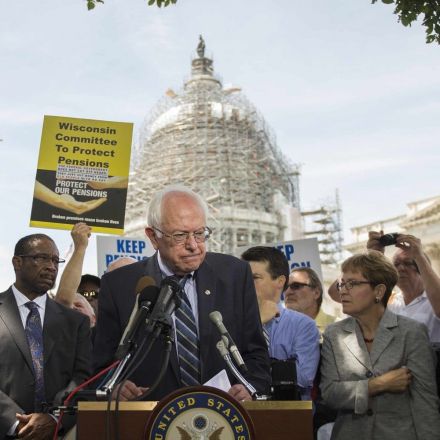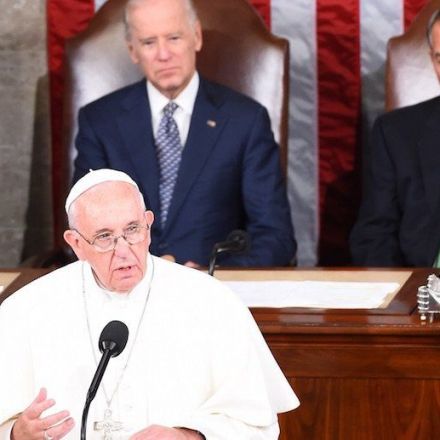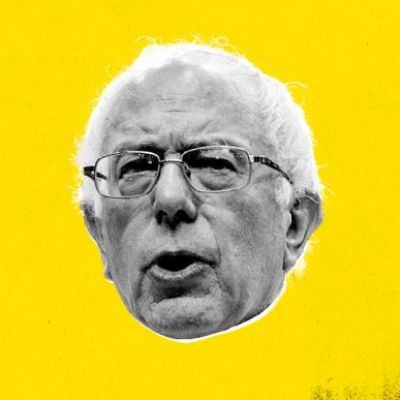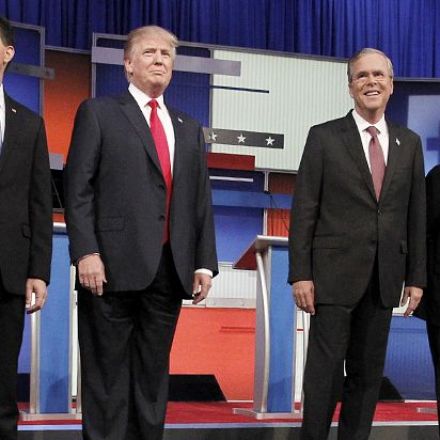

10 years ago
30
Our jobs are killing us—it's time to give every American a paid vacation
Sen. Bernie Sanders (I-Vt.) recently introduced the Guaranteed Paid Vacation Act to Congress. If passed, it would require employers with at least 15 workers to provide 10 days of paid vacation to every employee who has worked with them for more than a year.
Continue Reading


























Join the Discussion
This should be a given. Taking vacation days is a form of self-care. They help keep your mind and body up to snuff so that you can give 100% to the job at hand. Stressed out, overworked people tend to make shitty employees. Look at the bigger picture.
Spot-on. My workplace actively promotes taking leave, including unpaid leave and career breaks. I have not taken any extra leave myself, but just knowing it is there makes me feel like I have a better work-life balance and consequently, less stressed!
I find it really fascinating that people in America really think such mandatory vacations would hurt their economy. They are a fully developed country. If anything, they should stand for better quality of living and not just earning the next dollar. What is the point in being a Tier-1 country if people cannot even take 10 days off from work in a year?
You know what our ailing economy really needs? More barriers for the labor market. And then there's this:
We need regulations on when people can use their technology. This is a matter of national health, perhaps Senator Sanders would like to introduce the Put the iPad Down and Go to Sleep Act to Congress, requiring all technology be turned off after 9:30pm.
Because if we lift regulations from our markets and trust business owners to behave the magic of the Free Market Fairy will surely solve everything! Greenspan thought that too, up until the financial market ate itself.
The banks dicked around because they knew they had Washington in their pockets to bail them out when it all went up in smoke, which is exactly what happened.
Of course. That's the free market in action, exploiting any resource or loophole that might benefit them. Anything "too big to fail" should be nationalized, broken apart and sold off again.
It's not a free market when the businesses are guaranteed a reward for failing. And nothing is "too big to fail."
The market was given freedom for businesses to do what they wanted. That's as much of a "free market" as I ever care to get. Too close for my taste.
"to do what they wanted" without consequence. That is the key to the whole situation. In a free market there are costs associated with risks, and those costs were not present, so they risked as much as they could.
That's what happens without regulation. We've seen it over and over again. And eventually it builds up to the point where everyone suffers, not just the bad actors in the market. We've seen that over and over again, too. It's why we eventually tasked the government with regulating businesses so they could stop bad behavior before it turns into a catastrophe for the rest of us.
There wouldn't have needed to be regulation if they knew that their bad practices would have bankrupted them and landed them in prison in the first place.
Except history demonstrates that the threat of bankruptcy doesn't stop them from engaging in bad behavior. They're willing to gamble massive for short term gains at the expense of long term planning. That's why we experienced repeated depressions in the Nineteenth Century and why they finally started moving to put a stop to it in the Twentieth, because the market didn't learn. People would enter the market, make a fortune, drive us all into a crash and then start it all over again.
We don't regulate because someone decided it would be fun to play dictator to the market. We regulate because it was repeatedly demonstrated that we can't trust businesses to do the right thing for their employees, their customers or their neighbors. The primary focus of markets is to produce goods and gather wealth, and whether or not anyone else gets hurt in the process is secondary.
The repeated "depressions" (panic is the accepted terminology) were market corrections that lasted relatively short periods and ended with a healthier market at the end. These contractions occurred because banks were basically allowed to commit fraud by using a fraction reserve banking policy of lending money, thus artificially increasing the money supply, as well as the various attempts at central banking. Cheap credit leads to greater risks being taken, and cheap credit can come from fractional reserve banking or a central bank artificially manipulating interest rates.
That may be true of the specific markets, but history shows cyclical periods of boom-and-bust throughout the Nineteenth Century that affected far more than those individual markets. They had widespread impact that ruined people's lives, people who were in no way responsible for the "market correction." It wasn't just banks suffering, it was rampant throughout multiple industries like steel, transportation and so forth.
You may think this is a necessary and unavoidable consequence of doing business, but I really don't appreciate having my retirement package disappear during repeated "market corrections." Neither do most others. And since the market clearly isn't willing to regulate itself to stop this bad behavior, I need an advocate with the authority to force it to behave itself. The only advocate I know of with that power is the government.
Which is why industry regulation was begun in the first place.
Because the banks were allowed to commit fraud, i.e. the government wasn't regulating one of the few things it actually should have, or a central bank chartered by the government was manipulating the market.
It isn't, fraud and artificially set interests rates are terrible for the market, it makes people invest in ways that they wouldn't if they weren't being lied to.
You keep laying blame on "the market"... the market that is being legally defrauded and manipulated with government approval by organizations "too big to fail." How in the world could you expect the market to function properly under those circumstances?
Then advocate for the end of fractional reserve banking and the Federal Reserve. As long as markets are lied to, they will act irrationally and destructively, and the cycle will continue.
Ah, so you approve of regulation as long as it creates an outcome you want?
This was happening long before the government got involved or the federal reserve was created. Nineteenth Century.
Because the market has no conscience. If the market was being lied to, it was lying to itself and believing its own lies. Worker exploitation and misbehavior on the part of business leaders wasn't limited simply to the financial markets.
So we should take off the few leashes we have in place for oversight and regulation? I don't think so. I have no desire to return to unregulated boom-and-bust economics.
I believe protections against theft, murder, and slavery are the only legitimate functions of a government, yes. Fraud falls under the theft category.
Fractional reserve banking has been around since the 17th century. The Fed is not the first central bank of the US.
You realize "the market" is short-hand for all actors in it, not some monolithic being, right?
How does ending fractional reserve banking or the Fed "take off leashes"? The Fed has no oversight and fractional reserve banking is simply fraudulent.
And now we have regulated boom-and-bust economics, because we still have fractional reserve banking and a central bank to prop it up.
And we're back to this again. I suspect we'll end up going in circles here, so this is the last I'll say on this topic: the function of government is to serve the needs of the people. If the people demand that the government implement regulation then that becomes a government function.
I see. Is there a /t/conspiracy tribe I wasn't aware of? The US economy has always been defrauded and lied to -- by the US government?
I do. I also realize that it doesn't regulate itself as well as you seem to believe it would if only it were left alone.
No, the boom-and-bust cycles returned because we stopped enforcing regulation and started allowing businesses to have unhealthy influence over the government. The answer is not to strip the government of the functions demanded by its citizens but to restore accountability.
If all men got together and voted that all women should make themselves sexually available at request at any time, and it was made into law, would you support that? Where is the line you draw regarding the power of the government? I've stated my line.
Nice one! What's next, I'm a poop head?
You said it, not me. At worst the government is an enabler. But you know what else a central bank does well? Funds war efforts.
The boom-and-bust cycles never ended, where are you getting the idea they "returned"? At what point was there not a boom-bust cycle? All we've got now is an institution that dampens the busts so they are only "recessions" until it can't do it any more and the dam breaks, then we get a "Great Recession".
You're disturbingly fond of slippery slope arguments.
Which is why I ask about /t/conspiracy.
The "market corrections" that followed government regulation didn't destroy people's lives. They didn't bring the economy down for the entire nation. We had recessions, yes, but nothing like what came back in 1989, 2001 and again in 2007. It's not a coincidence that these more extreme "corrections" began as we started to deregulate or relax regulations on our industries across the board.
I'm asking where you draw the line, what is the limit of government to regulate people in your opinion?
http://i.imgur.com/mC0ukiG.png
It doesn't really look like the numbers agree with that assertion. source
I'm going to quote a saying often attributed to Oliver Wendell Holmes: your right to swing your fist is limited by the proximity of my face. When my actions create a detriment to you and there seems to be no way to resolve it, we turn to the government as the arbiter of last option.
Really? History tells of record unemployment in post-war America? People losing their life savings in market panics? People losing their homes because of it? Or are you going to fall back on the typical apologetic that it was because of World War II?
Define detriment.
Not sure what you are alluding to here. The Federal Reserve System was adopted in 1913, so when exactly before that was "record unemployment" and "people losing their life savings"? Because the panics before were quite mild compared to what would come after the Fed was created.
Poverty, unemployment and so forth typically qualify.
Mild? I'm not sure what history you're referring to but it has nothing to do with the Nineteenth Century compared to the Twentieth.
That's incredibly vague. Does getting fired by your employer qualify? Employer going out of business from a competitor qualify?
And yet estimated levels of unemployment in the 19th century were never about 10%.
Was the employer reckless? Was the problem preventable? Did they bring everyone else down with them? Is it something that can be prevented with regulation? Then yes.
And again, I don't know what history you're referencing. You are entitled to your own opinions, but you are not entitled to your own facts. That being the case I'm finished arguing here. The last comment is yours.
[This comment was removed]